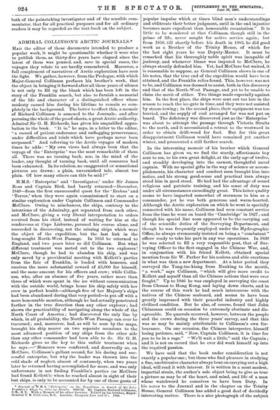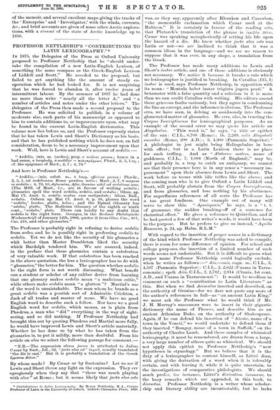ADMIRAL COLLINSON'S ARCTIC JOURNALS.* HAD the editor of these documents
intended to produce a popular work, it might be questionable whether it were wise to publish them, as thirty-five years have elapsed since the latest of them was penned, and, save in special cases, the voyages they relate to are hardly remembered. Moreover, a full complement of narratives of Arctic exploration have seen the light. We gather, however, from the Prologue, with which Major-General Collinson prefaces his brother's work, that the object in bringing it forward after all these years of silence is not only to fill up the blank which has been left in the story of the Franklin search, but also to furnish a memorial of the life and character of a distinguished officer whose modesty caused him during his lifetime to remain so com- pletely in the background. The better to effect this, a memoir of Richard Collinson is annexed to the Journals ; and after perusing the whole of the proof-sheets, a great Arctic authority, Admiral Sir G. H. Richards, has given his unqualified appro- bation to the book. " It is," he says, in a letter to the editor, " a record of patient endurance and unflagging perseverance, under difficulties and trials which have perhaps never been surpassed." And referring to the Arctic voyages of modern times he adds : " My own views had always been that the voyage of the ' Enterprise' was the most remarkable of them all. There was no turning back, nor, in the mind of the leader, any thought of turning back, until all resources had been exhausted. In its relation, no exaggerated or sensational pictures are drawn : a plain, unvarnished tale, almost too plain. Of how many others can this be said ?"
Enterprise' and Investigator,' under Sir James Ross and Captain Bird, had barely returned—December, 1849—from the first unsuccessful quest for the ' Erebus' and
Terror,' when they were again commissioned to start on a similar exploration under Captain Collinson and Commander McClure. Owing to mischances, the ships, contrary to the intentions of the Admiralty, got separated from each other, and McClure, giving a very liberal interpretation to orders received from his chief, instead of waiting for him at the rendezvous at Cape Lisburne, pursued his course alone, and succeeded in discovering, not the missing ships which were the object of the expedition, but the last link in the long-sought North-West Passage. In 1853 he returned to England, and two years later so did Collinson. But what different treatment was meted out to the two explorers ! McClure, though he had to abandon his ship, and was only saved by a providential meeting with Kellett's parties from the fate of Vranklin, is loaded with honours, and receives the more substantial reward of 25,000 for himself, and the same amount for his officers and crew; while Collin- son, who, after an absence of five years, rather more than three of which were spent in the ice without communication with the outside world, brings home his ship safely with her crew in perfect health—although five of her Majesty's ships had been abandoned during that very period—is put off with a mere honourable mention, although he had actually penetrated further in the true direction than any other explorer ; had shown the practicability of navigating along the whole of the North Coast of America ; had discovered the only line by which, in all probability, the North-West Passage can ever be traversed ; and, moreover, had, as will be seen by the maps, brought his ship nearer on two separate occasions to the most advanced position of any ships from the other side than any other commander had been able to do. Sir G. H. Richards gives us the key to this unfair treatment when he says :—" Honours were conferred, and deservedly so, on McClure, Collinson's gallant second, for his daring and suc- cessful enterprise, but why the leader was thrown into the cold shade of neglect, almost of contumely, when two years later he returned having accomplished far more, and was only unfortunate in not finding Franklin's parties (as McClure had found Kellett's) when he reached almost in sight of their lost ships, is only to be accounted for by one of those gusts of • Journal of 1/. M S. 'Enterprise on the Expedition in S-arch of Sir John Franklin's Ships by me), ng Straits. 1850-55. By Captain Richard Collimson, C.B., R N. With a Memoir of his other Services. Edited by his brother, Major- General T. B. Colli non, R.E. London: Sampson Low and C 1389.
popular impulse which at times blind men's understandings and obliterate their better judgment, until in the end injustice becomes more expedient than honourable recantation." It is little to be wondered at that Collinson, though still in the prime of life, never sought for active service again ; but from 1858, till shortly before his death in 1883, he did good work as a Brother of the Trinity House, of which for the last eight years he was Deputy-Master. It must be remarked that his thoroughly noble spirit was incapable of jealousy, and whenever blame was imputed to McClure, he always stoutly defended him. Yet, had McClure but waited, it is reasonable to suppose, as General Collinson shows in one of his notes, that the true end of the expedition would have been attained, and the Franklin relics found. This, however, was not to be, and Collinson was doomed to assist, both in this discovery and that• of the North-West Passage, and yet to be unable to claim the merit of either. Two things made especially against him. In the first place, the ships were sent out too late in the season to reach the ice-gate in time, and they were not assisted by steam-towing; in the second place, their equipment was too hurried, and the supply of coal arranged for was not put on board. The deficiency was discovered just as the Enterprise' was about to attempt the passage through Victoria Straits to the north, and it necessitated a retreat to the westward in order to obtain drift-wood for fuel. But for this great disappointment Collinson would have remained yet another winter, and prosecuted a still farther search.
In the interesting memoir of his brother which General Collinson has given us, we find the sturdy, affectionate boy sent to sea, to his own great delight, at the early age of twelve, and steadily developing into the earnest, thoughtful naval captain. With no special gifts in the way of science or accom- plishments, his character and conduct soon brought him into notice, and his strong good-sense and practical turn always stood him in good stead. He had had the advantage of sound religious and patriotic training, and his sense of duty was under all circumstances exceedingly great. This latter quality seems to have imparted somewhat of sternness to him as a commander, yet he was both generous and warm-hearted. Although the Arctic exploration on which he went is specially connected with his name, Collinson had seen constant service from the time he went on board the Cambridge' in 1827 ; and though his special line soon appeared to be the carrying out of the scientific duties of the Surveying Department, and though he was frequently employed under the Hydrographic Office, he always strenuously insisted on being a " combatant " officer ready to take his part in any war operations. In 1839 he was selected to fill a very responsible post, that of Sur- veying Officer to the fleet engaged in the Chinese War, and, in conjunction with his friend Kellett, obtained special mention from Sir W. Parker for his zealous and able exertions in what was then a new department. At a later period they surveyed the Yang-tse-kiang from Nanking to the mouth, " a work," says Collinson, " which will give more credit to Kellett and myself than all the Chinese actions that were ever fought." Up to 1846 he was employed in surveying the coast from Chusan to Hong Kong, and laying down charts, and in the course of this work he had much intercourse with the natives of the Chinese seaboard, and seems to have been greatly impressed with their peaceful industry and highly civilised condition. But he also, of course, found that John Chinaman could on occasion be extremely obstinate and dis- agreeable. No quarrels occurred, however, between the people and the crews during the three years' survey, and that this was so may be mainly • attributable to Collinson's own for- bearance. On one occasion, the Chinese interpreter, himself losing patience, said, " Now, Captain Collinson, it is time for you to be in a rage." " We'll wait a little," said the Captain ; and it is not on record that he ever did work himself up into the required passion.
We have said that the book under consideration is not exactly a popular one ; but those who find pleasure in studying a fine, unobtrusive character always bent on carrying out a high ideal, will read it with interest. It is written in a most modest, impartial strain, the author's sole object being to give as true a picture as may be of the heart, and mind, and life of a man whose watchword he conceives to have been Duty. In his notes to the Journal and in the chapter on the Trinity House, General Collinson has added a good deal of decidedly interesting matter. There is a nice photograph of the subject of the memoir, and several excellent maps giving the tracks of the Enterprise' and ' Investigator,' with the winds, currents, &c., and brief accounts are given of some other Arctic explora- tions, with a resume of the state of Arctic knowledge up to 1850.



















































 Previous page
Previous page